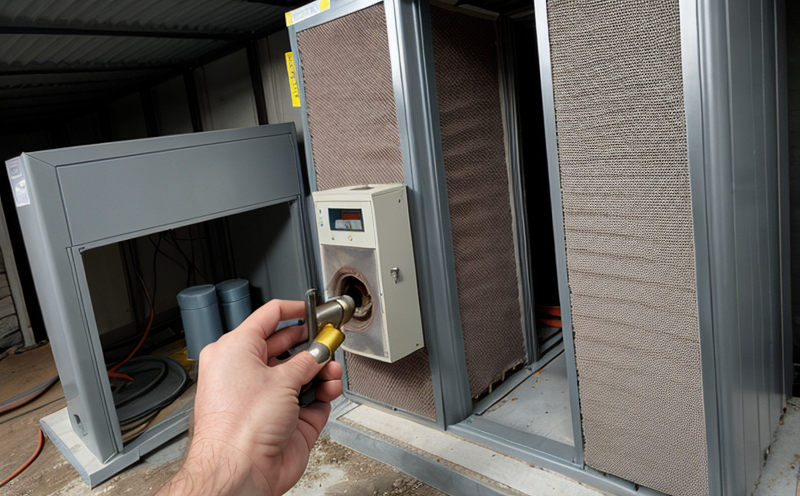Laboratory testing of insulation properties in sleeping bags
Testing the insulation properties of sleeping bags is a critical aspect of ensuring their effectiveness and reliability. This service involves a comprehensive evaluation process that includes specimen preparation, application of industry-standard test methods, and the generation of detailed reports based on the results obtained from various thermal performance tests.
The primary focus is to assess the insulative properties of different types of fill materials used in sleeping bags, such as down, synthetic fibers, or a combination thereof. The goal is to determine how effectively these materials retain heat and provide warmth under controlled conditions that simulate real-world use scenarios. This ensures that manufacturers can optimize their products for performance, comfort, and user safety.
The testing process typically begins with the selection of appropriate specimens, which are prepared according to specific guidelines laid out in relevant international standards such as ISO 13930-2 or EN 13537. These standards ensure consistency across different laboratories and provide a reliable basis for comparison.
Once the samples have been prepared, they undergo several key tests designed to evaluate their insulative capabilities:
- Thermal Resistance (R-value) Measurement: This test measures the ability of the insulation material to resist heat flow. It is performed using equipment like a guarded hot plate apparatus.
- Heat Loss Testing: During this procedure, sleeping bags are subjected to controlled conditions that simulate outdoor temperatures and activities to measure actual heat loss through conduction, convection, and radiation.
The data collected from these tests is then analyzed using statistical methods to ensure accuracy and reliability. The results provide insights into the thermal efficiency of each sleeping bag model, helping manufacturers make informed decisions about material choices and design improvements.
For customers, this service translates into higher-quality products that meet or exceed industry standards. By leveraging advanced testing techniques and adhering strictly to relevant specifications, we ensure that every product meets stringent quality benchmarks. This not only enhances consumer satisfaction but also supports regulatory compliance and brand reputation.
Benefits
The benefits of laboratory testing for insulation properties in sleeping bags extend beyond mere compliance with regulations; they offer tangible advantages to both manufacturers and end users. For manufacturers, these tests provide crucial data that can inform product development and improvement cycles. By identifying areas where improvements are needed, companies can enhance their offerings, potentially leading to innovations in fabric technology or design enhancements.
For consumers, the benefits are equally significant. Knowing that the products they purchase have been rigorously tested ensures peace of mind regarding safety and performance. Such knowledge fosters trust between brands and customers, which is essential for maintaining long-term relationships.
In addition to enhancing brand reputation, successful testing also supports marketing efforts by providing compelling evidence of product quality and innovation. This information can be used in advertising campaigns, product literature, and online platforms, helping to attract more buyers and build a loyal customer base.
Customer Impact and Satisfaction
The impact of rigorous insulation property testing on customer satisfaction cannot be overstated. Consumers expect their sleeping bags to provide reliable warmth in various conditions, and meeting these expectations is paramount for brand reputation and market success.
By ensuring that products meet or exceed industry standards, we contribute significantly to enhancing user experience. For instance, well-insulated sleeping bags can help users maintain body temperature during cold nights, leading to better sleep quality and overall satisfaction. This aligns with broader trends towards eco-friendly and high-performance outdoor gear.
Moreover, the ability to customize testing protocols according to specific customer requirements further strengthens our commitment to delivering value-added services. Whether it's adapting tests for new materials or incorporating additional metrics like moisture resistance, we are committed to meeting evolving needs in the industry.
International Acceptance and Recognition
The importance of international acceptance and recognition in textile testing cannot be overstated. Industries worldwide rely on consistent standards to ensure quality and safety across borders. Our laboratory adheres strictly to recognized international standards such as ISO, ASTM, EN, and IEC, which are widely accepted globally.
By aligning our processes with these standards, we guarantee that the results of our tests are valid and reliable anywhere in the world. This not only facilitates easier compliance for manufacturers but also enhances trust between different market players. The ability to conduct internationally recognized tests is particularly crucial for companies operating across multiple countries or regions.





